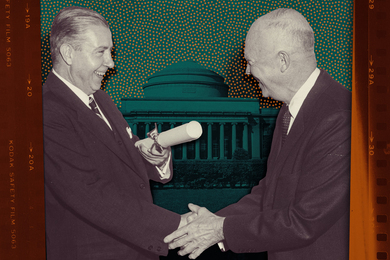Professor Emerita Catherine Vakar Chvany, a renowned Slavic linguist and literature scholar who played a pivotal role in advancing the study of Russian language and literature in MIT’s Foreign Languages and Literatures Section (now Global Studies and Languages), died on Oct. 19 in Watertown, Massachusetts. She was 91.
Chvany served on the MIT faculty for 26 years before her retirement in 1993.
Global Studies and Languages head Emma Teng noted that MIT’s thriving Russian studies curriculum today is a legacy of Chvany’s foundational work in the department. And, Maria Khotimsky, senior lecturer in Russian, said, “Several generations of Slavists are grateful for Professor Chvany’s inspiring mentorship, while her works in Slavic poetics and linguistics are renowned in the U.S. and internationally.”
A prolific and influential scholar
A prolific scholar, Chvany wrote "On the Syntax of Be-Sentences in Russian" (Slavica Publishers, 1975); and co-edited four volumes: "New Studies in Russian Language and Literature" (Slavica, 1987); "Morphosyntax in Slavic" (Slavica, 1980); "Slavic Transformational Syntax" (University of Michigan, 1974); and "Studies in Poetics: Commemorative Volume: Krystyna Pomorska" (Slavica Publishers, 1995).
In 1996, linguists Olga Yokoyama and Emily Klenin published an edited collection of her work, "Selected Essays of Catherine V. Chvany" (Slavica).
In her articles, Chvany took up a range of issues in linguistics, including not only variations on the verb “to be” but also hierarchies of situations in syntax of agents and subjects; definiteness in Bulgarian, English, and Russian; other issues of lexical storage and transitivity; hierarchies in Russian cases; and issues of markedness, including an important overview, “The Evolution of the Concept of Markedness from the Prague Circle to Generative Grammar.”
In literature she took up language issues in the classic "Tale of Igor's Campaign," Teffi’s poems, Nikolai Leskov’s short stories, and a novella by Aleksandr Solzhenitsyn.
From Paris to Cambridge
“Catherine Chvany was always so present that it is hard to think of her as gone,” said MIT Literature Professor Ruth Perry. “She had strong opinions and wasn't afraid to speak out about them.”
Chvany was born on April 2, 1927, in Paris, France, to émigré Russian parents. During World War II, she and her younger sister Anna were sent first to the Pyrenees and then to the United States with assistance from a courageous young Unitarian minister’s wife, Martha Sharp.
Fluent in Russian and French, Chvany quickly mastered English. She graduated from the Girls’ Latin School in Boston in 1946 and attended Radcliffe College from 1946 to 1948. She left school to marry Lawrence Chvany and raise three children, Deborah, Barbara, and Michael.
In 1961-63, she returned to school and completed her undergraduate degree in linguistics at Harvard University. She received her PhD in Slavic languages and literatures from Harvard in 1970 and began her career as an instructor of Russian language at Wellesley College in 1966.
She joined the faculty at MIT in 1967 and became an assistant professor in 1971, an associate professor in 1974, and a full professor in 1983.
Warmth, generosity, and friendship
Historian Philip Khoury, who was dean of the School of Humanities, Arts and Social Sciences during the latter years of Chvany’s time at MIT, remembered her warmly as “a wonderful colleague who loved engaging with me on language learning and how the MIT Russian language studies program worked.”
Elizabeth Wood, a professor of Russian history, recalled the warm welcome that Chvany gave her when she came to MIT in 1990: “She always loved to stop and talk at the Tuesday faculty lunches, sharing stories of her life and her love of Slavic languages.”
Chvany’s influence was broad and longstanding, in part as a result of her professional affiliations. Chvany served on the advisory or editorial boards of "Slavic and East European Journal," "Russian Language Journal," "Journal of Slavic Linguistics," "Peirce Seminar Papers," "Essays in Poetics" (United Kingdom), and "Supostavitelno ezikoznanie" (Bulgaria).
Emily Klenin, an emerita professor of Slavic languages and literature at the University of California at Los Angeles, noted that Chvany had a practice of expressing gratitude to those whom she mentored. She connected that practice to Chvany’s experience of being aided during WWII. “Her warm and open attitude toward life was reflected in her continuing interest and friendship for the young people she mentored, even when, as most eventually did, they went on to lives involving completely different academic careers or even no academic career at all,” Klenin said.
Memorial reception at MIT on November 18
Chvany is survived by her children, Deborah Gyapong and her husband Tony of Ottawa, Canada; Barbara Chvany and her husband Ken Silbert of Orinda, California; and Michael Chvany and his wife Sally of Arlington, Massachusetts; her foster-brother, William Atkinson of Cambridge, Massachusetts; six grandchildren; and nine great grandchildren.
A memorial reception will be held on Sunday, Nov. 18, from 1:30 to 4:00 p.m. in the Samberg Conference Center, 7th floor. Donations in Chvany’s name may be made to the Unitarian Universalist Association. Visit Friends of the UUA for online donations. Please RSVP to Michael Chvany, Mike@BridgeStreetProductions.com, if you plan to attend the memorial.
Internationally renowned for her works in Slavic poetics and linguistics, Chvany also mentored several generations of scholars.
Publication Date:
Press Contact:
Emily
Hiestand
Email:
hiestand@mit.edu
Phone:
617-324-2043
Office of the Dean, School of Humanities, Arts, and Social Sciences

Caption:
MIT Professor Emerita Catherine Vakar Chvany was a renowned Slavic linguist and literature scholar.
Credits:
Photo courtesy of the Chvany family.





